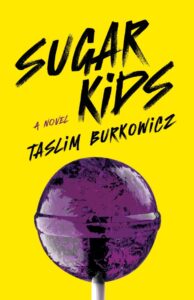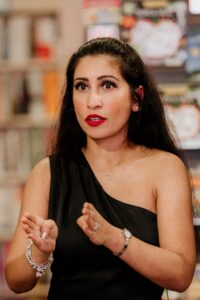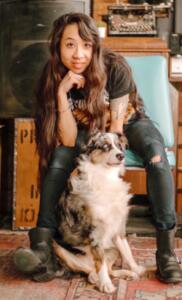The agony, the Ecstasy, the ‘90s
Sugar Kids
by Taslim Burkowicz
Halifax: Fernwood Publishing, 2024
$24.00 / 9781773636757
Reviewed by Jessica Poon
*

Reading Sugar Kids by Surrey’s Taslim Burkowicz is like finding a sour key in a White Girl W@$ted cocktail from Gringos. By that I mean: a complete delight that goes down with startling ease, followed up with a lingering aftermath of my-God-what-have-we-here.
Turning the pages, I was reminded of a line from the somewhat insufferable pal of Tom Cruise’s in Vanilla Sky: “Just remember, the sweet is never as sweet without the sour, and I know the sour.” Don’t be fooled by the upbeat effervescent title. There is definitely sour within the sweet in this engrossing novel; they co-exist like inseparable, dysfunctional siblings.
Extraordinary is a word with a serious identity issues. If split apart, you get extra ordinary. More normal. More average. As a kid, I knew the word made no goddamn sense but in society, you pretend illogical things are reasonable. Anyway, once you shack up extra and ordinary à la an interracial buddy cop movie, the word becomes the opposite of its constituents; extraordinary = special.
All this linguistic preamble is just to say that Burkowicz’s protagonist, Baby, an Indo-Canadian adolescent, is completely remarkable but also totally ordinary. Extraordinary. For one, she reads for pleasure, which is the calling card of every precocious teenager about to have a drug problem. Her twin brother, Ravi, is dead, but appears before her frequently. Her mother is dead and her father is largely absent. Her friends are a couple of skateboarding misfits—Stick Boi, endearingly lovable white trash with dyslexia and considerable drawing talent, and Takeshi, who, despite being given a “cool” Western name like Jed, is nevertheless referred to by his explicitly Japanese surname.
Sugar Kids takes place in the Nineties, and you’ll feel like you’re in this decade as you read it.
Baby has a locket Takeshi gave her that contains picture that Baby believes to be Takeshi’s grandmother. By all measures, this present courageously declares Yes, I am into you. Even so, Baby and Takeshi’s romance is of the stalled-but-clearly-something’s-there sort, which made me positively queasy with adolescent recognition.
One problem with adulthood that no one ever tells you, of course, is that you are inundated with hysterically vivid memories of adolescence and, failing that—for my friends who have done sufficient drugs to be spared such memories—the perennial reminder that while you might have more responsibilities, you will always, always love the music you loved as a teenager. And music certainly plays an important role in this novel. There’s a reason people cleave to music as a shortcut to identity—it somehow encompasses everything and it is simultaneously fleeting, but with the ability to be put on repeat, like a specific memory you can re-live indefinitely.
I have never said this in my increasingly less young life but Sugar Kids is that rare novel that succeeds in portraying different ethnicities without coming across as I Did It For The Optics; rather, it feels like a realistic portrait of multicultural Vancouver.

In fact, Burkowicz (Ruby Red Skies) succeeds in making the setting of Vancouver a veritable character. As a reader who openly loathes setting—in part because I have read entirely too many passages that took place in fields or bodies of water where white people had revelations about their mistakes—I loved what Burkowicz does with Vancouver as a setting and a character.
I felt as though I were simultaneously admonishing and falling in love with the city I was born in at the same time. And I say this as a person who frequently says, “What do people see in this city, besides mountains?” Burkowicz clearly knows Vancouver, in all its fineries, vagaries, and socioeconomic inequalities. To read this novel is to look closely at Vancouver’s cellulite from all angles.
When Baby meets Delilah, a beautiful and charismatic half-Chinese woman, in a Burger King Baby’s life metamorphoses into a succession of dancing, drug use, music, and ostentatious clothing dissimilar to her usual skater style. Her attendance in school becomes spotty, but she still writes poetry that Colleen, the plant-loving school counsellor, champions.
Baby’s new lifestyle largely eliminates Stick Boi and Takeshi from her orbit—their newly strained, now infrequent interactions are awkward and betray the intimacy of close observation of someone you once loved/still love. Whether Baby wants to be Delilah or wants to be with Delilah—well, it’s probably a bit of both.
Delilah is twenty-six, almost a decade older than Baby and becomes Baby’s portal to the rave scene. Delilah introduces Baby to Jimmy, Delilah’s ex-boyfriend and drug dealer, who professes to preferring European women with the nonchalance of preferring salad to fries; Eva, Delilah’s successor and Jimmy’s angelic-looking girlfriend, whom Baby confides in while they are both high; Jie, a former sex worker who Baby becomes particularly close with; Bryce, a bouncer with a tendency to politicize and proselytize; and Kwame, a co-worker of Delilah’s who wants to become a doctor, among many others.
When Baby’s father unceremoniously leaves a note kicking Baby out of the household, he suggests Baby move in with her grandmother. Instead, she finds refuge in Jimmy’s vintage clothing store, which is how she meets Jie. In this sense, Jimmy is the unlikely Christian patron saint for girls who are ethnically not his purported type. Baby’s absence at her grandmother’s house is never investigated by her father, a widower who, by Asian parental standards and general parenting standards, is unusually neglectful.
Although the multi-ethnic, significantly older adult characters that come to populate Baby’s new guise as a raver provide fun and insight, there’s something to be said for not being beyond one’s years. Baby’s grades drop. She continues to write poetry. She does not confide in her former friends, though she does call Takeshi in the middle of the night during a rave and they both know who is on the other end of the line but say nothing of substance, because it is all known but torturously unsayable. This scene could give André Aciman (Call Me by Your Name) and his epically charged phone calls a run for his money.
Baby stops seeing her twin brother Ravi, though one of her acquaintances does see Ravi once, unprompted, which is never further explored but alludes to the possibility of ghosts being real without being dwelt upon. Baby has sex before she’s ready, for reasons that are simultaneously clear and unclear. In other words, life is a hot mess with occasional sequins and Indian take-out. There are fruit smoothies and moments of grace and Victorian fiction, but there are also drug overdoses, financial precarity, and unsolicited lectures on whether it’s okay to admire white authors as a brown woman.
Baby has a lot of wonderments. For instance: who gets to enjoy Jane Eyre without getting the third degree? Are ethnic sexual preferences always problematic and colonial? Who gets to enjoy drugs in moderation without experiencing consequences? Who gets the happy ending and do such things exist, even? The novel is told in fifty breezy chapters but packs in realistic dialogue, sentence type variation, and thought-provoking questions in all of them. The yearning of adolescence on the cusp of adulthood is captured with hyper-specificity, on-point sonic references, and zero condescension. It is near perfect.
Sexual frustration, mediocre sex, and thwarted romance are mainstay ingredients in literature and television. But romantic fulfillment in art is, however satisfying for long-suffering characters of improbable beauty, often deeply yawn-inducing. Often, not even the most valiantly gratuitous sex scenes can redeem such tedium. Attempts to enact a similar level of tension usually means a couple has boring squabbles of manufactured drama or overly theatrical break-ups.
And so, it is with this bias that I am mostly unenthused about the ending of Sugar Kids, an otherwise fabulous book chronicling a teenager’s foray into drugs, music, and sex. Not all struggle gets a beautiful glow-up and perfectly targeted high-five. I did appreciate that Baby’s continued interest in women doesn’t transmogrify into Adrienne Rich’s worst nightmare of a palatable heterosexual wedding cake of bi-erasure. I am willing, in spite of my considerable and hard-earned bitterness, to forgive a bit of arguably unrealistic happiness in literature, especially after Baby’s arduous journey.
Sugar Kids is a zippy marvel of truth bombs and deserves a wide audience. This book is like a handful of Swedish Fish coated with Ecstasy. The sweet, the sour, and the inexplicable otherwise known as reality make for a real ensemble cast here. Sugar Kids ought to be assigned along with The Outsiders in the canon of exceedingly honest books that teenagers might willingly read, for Baby can easily ride alongside Ponyboy.
*

Originally from East Vancouver, Jessica Poon is a writer, former line cook, and pianist of dubious merit who recently returned to BC after completing a MFA in Creative Writing at the University of Guelph. [Editor’s note: Jessica Poon has reviewed books by Sam Wiebe, Amy Mattes, Louis Druehl, Sheung-King, Loghan Paylor, Lisa Moore (ed.), Sandra Kelly, Robyn Harding, Ian and Will Ferguson, Christine Lai, Logan Macnair, Jen Sookfong Lee, J.M. Miro (Steven Price), Bri Beaudoin, Tetsuro Shigematsu, Katie Welch, Megan Gail Coles, and Ayesha Chaudhry for BCR]
*
The British Columbia Review
Interim Editors, 2023-25: Trevor Marc Hughes (non-fiction), Brett Josef Grubisic (fiction)
Publisher: Richard Mackie
Formerly The Ormsby Review, The British Columbia Review is an online book review and journal service for BC writers and readers. The Advisory Board now consists of Jean Barman, Wade Davis, Robin Fisher, Barry Gough, Hugh Johnston, Kathy Mezei, Patricia Roy, Maria Tippett, and Graeme Wynn. Provincial Government Patron (since September 2018): Creative BC. Honorary Patron: Yosef Wosk. Scholarly Patron: SFU Graduate Liberal Studies. The British Columbia Review was founded in 2016 by Richard Mackie and Alan Twigg.
“Only connect.” – E.M. Forster
3 comments on “The agony, the Ecstasy, the ‘90s”